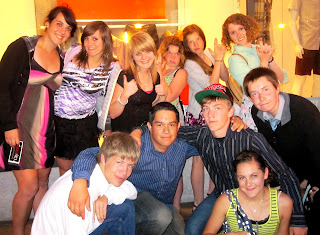"A mentor is someone who sees more talent and ability within you than you see in yourself, and helps bring it out of you." —Bob Proctor
 |
| East Entrance, Glacier National Park - Montana, USA |
How do you know if you are called to be a mentor? And what does it really mean to be a mentor?
When I began my summer job this year as a Resident Assistant for the Upward Bound 2012 Summer Academy at the Montana Tech campus, I knew that I would be placed in a mentoring position. One of the advantages I had was that I had been serving as an RA at my college for the past two years. Another advantage I had was that I had worked as an RA for Upward Bound last summer in 2011… which meant that I had the pleasure of knowing about half of the 70 students who were attending this summer. I was excited about the RA staff this year, knowing three other returning RA's and getting to know four new coworkers.
Yet no matter how much preparation you have for a job, you never really know what will happen… and how your life will be changed.
In my mind, being a mentor has a lot to do with how you conduct yourself as a person on a daily basis. If you think you’re going to win the respect and trust of someone, regardless if that person is younger or older than you, it all begins with your outlook on life and how you choose to interact with others. You are the only one who can make the conscious decision to believe in the honesty of another person until he or she proves you wrong. If you insist that everyone follows the rules, you must also follow those same rules. And you must adhere to the same consequences if you break those rules.
 |
| San Francisco, California - July 2012 |
Most rewarding for me was getting to see how 70 students gelled and grew together into an incredible family… one that produces friendships that will definitely last a lifetime.
And I am truly inspired by each and every one of them. I was able to reconnect with a gal who is willing to share HOBY (Hugh O’Brian Youth Leadership Program) cheers with her entire UB family. I was able sing a “Chitty Chitty Bang Bang” roll call cheer with 10 students I got to know so much better this summer, both new and old friends. I was able to see students bonding over painting nails (guys and girls), card games, movies, video games, service projects, and outdoor recreation.
It did hit me that I am a mentor—but it usually only hit me after a student has walked off when we finish a conversation. When I reflect, it's through these conversations that I am astounded by the life and fun that these young high schoolers have. In particular, I learned more about one particular guy on the day of Closing Ceremonies than I did during the entire time of the program, and it completely changed my perspective of him.
Unforgettable, how one conversation with someone can change everything.
As much as I have loved getting to know these students, I am even more in awe at how much they have taught me—about them, about myself, and about who we all want to be in this world. I’m glad to see that I have learned so much—more than I think they have learned from me. The friendships that I have discovered, with the students and with my fellow staff members, are unforgettable. I am blessed to have you all in my life.
My hope is that you are able to see yourself better than you did before, and have the courage to go for all your goals, to college and beyond.
Cheers to an unforgettable Upward Bound summer in Butte, Montana!
“What I've found about it is that there are some folks you can talk to until you're blue in the face—they're never going to get it and they're never going to change. But every once in a while, you'll run into someone who is eager to listen, eager to learn, and willing to try new things….” ― Tyler Perry